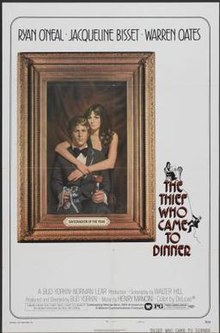The Thief Who Came to Dinner
| The Thief Who Came to Dinner | |
|---|---|
 | |
| Directed by | Bud Yorkin |
| Written by | Terrence Lore Smith (novel) Walter Hill |
| Produced by | Norman Lear Bud Yorkin |
| Starring | Ryan O'Neal Jacqueline Bisset Warren Oates Jill Clayburgh Ned Beatty Charles Cioffi Austin Pendleton Michael Murphy Gregory Sierra |
| Cinematography | Philip H. Lathrop |
| Edited by | John Horger |
| Music by | Henry Mancini |
| Distributed by | Warner Bros. |
Release date |
|
Running time | 104 minutes |
| Box office | $1,750,000 (US/ Canada rentals)[1] |
The Thief Who Came to Dinner is a 1973 comedy film directed by Bud Yorkin and based on the novel by Terrence Lore Smith. The film stars Ryan O'Neal and Jacqueline Bisset, with Charles Cioffi, Warren Oates, and in an early appearance, Jill Clayburgh.
Plot
Webster McGee (Ryan O'Neal) is a computer programmer who abruptly quits his job and adopts a life of crime as a jewel thief in Houston, Texas.
For his first job he robs rich businessman Henderling (Charles Cioffi), stealing from him not only money, but also files with information that could destroy Henderling's career. McGee uses them to blackmail him but instead of money he asks for introduction into high society—aiming to find a way to rob other rich houses.
He soon meets Laura (Jacqueline Bisset) at a society function hosted by Henderling. She falls in love with McGee and then helps him to burglarize several friends of Henderling.
Texas Mutual Insurance investigator Dave Reilly (Warren Oates) is intent on identifying Webster as the jewel thief, but in the course of investigation Reilly and McGee develop a sort of friendship. Reilly must decide whether to be loyal to his job or his new friend.
Cast
Production
Oliver Hailey wrote the first draft of the script from the novel. Walter Hill was hired to write a number of subsequent drafts, and received sole credit.[2]
Filming took place on location in Houston. Director Bud Yorkin is known for his association with Norman Lear; they collaborated on All in the Family and Maude for broadcast television. Following this film, Yorkin turned mainly to TV, along with Lear and writer Aaron Ruben. Yorkin did, however, direct three more feature films, including the sequel to Arthur starring Dudley Moore.
Differences between the novel and the movie
- Webster is not a computer programmer in the novel, and his last name is "Daniels".
- In the Terrence L. Smith novel, Webster meets his love in the Chicago metropolitan area, where all the thefts and almost all of the story take place. (Smith was a native of northern Illinois, and the Chicago area was the setting for most of his books.)
- In the novel, Webster starts the story with a scarred face and broken nose, having been a football star in college (Northwestern). Over the course of the novel, he uses his earnings to finance a set of plastic surgeries to make himself more conventionally handsome. With Ryan O'Neal in the lead, the movie drops this plotline entirely.
- In the novel, Webster's ex-wife is named Lina. After their divorce, she begins a successful acting career and despite her having left him they maintain some degree of friendship, and as the novel progesses she begins a romantic relationship with Dave Reilly. In the film, her name is changed to Jackie, her acting career may not be going well, there is still a degree of acrimony between her and Webster and her relationship with Dave is completely dropped.
- The fence Deems in the novel is a good friend of Webster's and is more street-wise, while in the film he is more middle-class and introduced to Webster through Dynamite.
Reception
Walter Hill later said "Warren Oates was very good in the movie - better than the movie was. They cut a lot of things of his out of the movie they shouldn't have."[2]
